Science
Scientists Rally Against Antiscience Movement in New Book

The ongoing conflict surrounding science has intensified, as highlighted in the new book, Science Under Siege, by climate scientist Michael Mann and vaccine developer Peter Hotez. Both authors illustrate their experiences as targets of harassment and misinformation campaigns while advocating for their respective fields. They argue that the recent surge in antiscience sentiment poses a significant threat to public health and environmental stability.
As the 21st century progresses, summers in the global north are increasingly marked by extreme weather events, including flash floods, droughts, and intensifying storms. This reality aligns with predictions made by scientists from Exxon in the 1970s. Amid this climate crisis, the United States Secretary of Health and Human Services has discouraged the use of critical tools necessary to combat infectious diseases, further complicating the public health landscape.
Mann, known for his development of the controversial hockey stick graph in 1998, which illustrated the alarming rise in global temperatures, and Hotez, who created a low-cost COVID-19 vaccine using public funding, did not foresee themselves becoming advocates for science. Their roles as “unlikely crusaders” emerged from a necessity to defend their disciplines against growing misinformation.
Convergence of Climate and Health Issues
The convergence of climate change and public health issues is a central theme in the authors’ arguments. They explain how climate change is altering the habitats and behaviors of wildlife that carry diseases, increasing the risk of zoonotic transmissions to humans. This growing proximity to disease-carrying species, they assert, compounds the threats posed by both climate change and infectious diseases.
Mann and Hotez contend that a more insidious force is at work: a concerted attack on science led by the current Republican Party. They identify five primary groups contributing to this antiscience agenda:
1. Plutocrats and their political action committees
2. Petrostate politicians and polluters
3. Misleading professionals, including some physicians and academics
4. Propagandists, particularly those utilizing podcasts
5. Certain media outlets
According to the authors, these groups collaborate to create and spread misinformation, undermining public trust in scientific findings.
In their analysis, Mann and Hotez note that antiscience propaganda is not a novel phenomenon; it has historical roots in authoritarian regimes. For instance, during the Soviet era, Joseph Stalin targeted scientists to suppress dissenting views and stabilize his regime, leading to dire consequences for public welfare. The authors argue that discrediting science is a tactic used to weaken societal structures that rely on knowledge and truth.
Call to Action Against Misinformation
The authors trace the trajectory of antiscience messaging surrounding COVID-19, which mirrored the patterns observed in climate change discussions but unfolded in a matter of months. Initially, the seriousness of the pandemic was downplayed, evolving into narratives that discouraged collective action due to economic concerns. This culminated in an environment where scientists were scapegoated for societal issues, further complicating efforts to address both the pandemic and climate change.
Mann and Hotez emphasize that such misinformation not only misleads the public but also fosters division, hindering collective action necessary to tackle complex global challenges. They argue that overcoming these “dark forces of antiscience” is crucial for the future of humanity and the health of the planet.
The authors’ motivations stem from a desire to hold those in power accountable. They suggest that the actions of plutocrats and polluters reveal a primary goal: to maintain their influence by obstructing regulatory measures that would protect public health and the environment.
In their conclusion, Mann and Hotez urge the public to take political action as a means of reversing the current trajectory. They advocate for increased voter turnout to support politicians prioritizing the well-being of citizens over corporate interests. They express concern that without systemic changes, the future of both science and society remains bleak.
The release of Science Under Siege serves as both a warning and a rallying cry for those committed to defending scientific integrity. The authors hope that their insights will galvanize action against the pervasive antiscience movement, ensuring that future generations can rely on the scientific method as a tool for understanding and improving the world.
-

 Science2 months ago
Science2 months agoToyoake City Proposes Daily Two-Hour Smartphone Use Limit
-

 Health2 months ago
Health2 months agoB.C. Review Reveals Urgent Need for Rare-Disease Drug Reforms
-

 Top Stories2 months ago
Top Stories2 months agoPedestrian Fatally Injured in Esquimalt Collision on August 14
-

 Technology2 months ago
Technology2 months agoDark Adventure Game “Bye Sweet Carole” Set for October Release
-

 World2 months ago
World2 months agoJimmy Lai’s Defense Challenges Charges Under National Security Law
-

 Technology2 months ago
Technology2 months agoKonami Revives Iconic Metal Gear Solid Delta Ahead of Release
-

 Technology2 months ago
Technology2 months agoSnapmaker U1 Color 3D Printer Redefines Speed and Sustainability
-

 Technology2 months ago
Technology2 months agoAION Folding Knife: Redefining EDC Design with Premium Materials
-

 Technology2 months ago
Technology2 months agoSolve Today’s Wordle Challenge: Hints and Answer for August 19
-

 Business2 months ago
Business2 months agoGordon Murray Automotive Unveils S1 LM and Le Mans GTR at Monterey
-

 Lifestyle2 months ago
Lifestyle2 months agoVictoria’s Pop-Up Shop Shines Light on B.C.’s Wolf Cull
-

 Technology2 months ago
Technology2 months agoApple Expands Self-Service Repair Program to Canada









